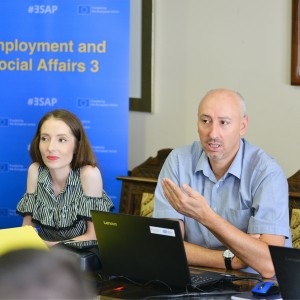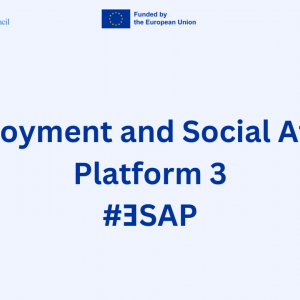RCC ESAP 2: Western Balkan Public Employment Services Visit Employment Service of Slovenia to discuss aligning Western Balkan practices with the EU requirements

Study Visit to Employment Service Slovenia - Family photo (Photo: RCC)

Study Visit to Employment Service Slovenia (Photo: RCC)
RCC ESAP 2 Organised a Two-day Thematic Study Visit to Employment Service of Slovenia to discuss Active Labour Market Policies and Measures: good practices, IT solutions, databases, statistics and reporting
Ljubljana, Slovenia – Around 20 representatives from Public Employment Services (PES) from the Western Balkan region visited Employment Service of Slovenia (ESS). The two-day Study Visit followed a successful workshop held in Budva, Montenegro in October 2023 on classification and recording of Labour Market Policies (LMPs) and Roadmaps for their alignment with the EU methodology. The Study Visit to the Slovenian Employment Service focused on the topic of classification of Labor Market Policies and measures according to EU standards, with a particular emphasis on IT solutions, databases, statistics, and reporting.
Metka Barbo Skerbinc, ESS Acting Director welcomed their Western Balkan colleagues expressing satisfaction over successful cooperation and learning opportunities. Barbo Skerbinc emphasized the need of proactive approach of public employment services to main labour market actors - employers and the unemployed. She underlined that all activities of the ESS are aimed at the achieving best possible matching between jobs available on the labour market and offer of skilled labour. To that end, according to her, Slovenia registers the record low unemployment rate of 3.6% but also constant need for skilled and competent workforce, dictated by the labour market demand especially in service industry and construction. The main challenge, she stressed, was activation of registered unemployed persons from the category of the long-term unemployed but also of young people who are entering the labour market.
Ratka Babic, RCC ESAP 2 Acting Team Leader thanked the Slovenian hosts for their willingness to share their experiences in the implementation of the labour market measures, design and targeting of these measures as well as monitoring and evaluation process aimed at adjusting the measures to make a better fit for the labour market needs. In terms of the development of IT solutions for communication with the employers and unemployed persons and reporting on the results, Western Balkan PESs had an opportunity to learn a lot from experience of their Slovenian peers on how to advance their systems to best address the labour market realities, Babic concluded.
The first day of the Study Visit started with a warm welcome by the host, followed by the presentation introducing the attendees to the ESS and providing essential labour market data. A detailed presentation explored the strategies and methods used by ESS in collaborating with employers, emphasizing effective practices and current challenges. The following session focused on the implementation of Active Labour Market Policies and Measures, with an emphasis on IT solutions, databases, statistics, and reporting. The presentation highlighted the Slovenian experience aligning with the EU guidelines, addressing challenges, and presenting solutions. The event continued with a session on Slovenian experiences in utilizing LMP statistics to redesign policies, with the emphasis on accurate statistics for planning purposes. The final segment allowed for further debate and specific questions on the presented contents. The day concluded with a workshop facilitated by RCC ESAP 2 for the Western Balkan PESs to reflect on the witnessed ESS practices but also to exchange ideas on how to enhance exsisting individual practices of the Western Balkan PESs, based on what they have learned.
On the second day, the participants learned more about the role of ESS's regional office in Ljubljana and current state of the local labour market. This session, full of practical examples, provided for an interactive exchange between the attendees and hosts. Following a brief networking break, the participants visited the Career Center at the Regional Office Ljubljana, where they have learned about the critical role of the Center in supporting local employment initiatives and equipping job seekers with valuable resources and tools needed for the job market. Attendees actively shared their thoughts and engaged in discussions, contributing to the overall dynamic and collaborative atmosphere.
This Study Visit to ESS builds on the successful completion of the Budva workshop as well as development of the report Aligning Western Balkan Labour Market Policy Databases with the EU Guidelines. The report offers a brief regional overview followed by comprehensive analysis of current practices and relevant databases in individual Western Balkan economies and provides roadmaps for alignment of these databases with the EU guidelines. The ultimate aim of these reforms is improvement of the employment opportunities and working conditions for the citizens in the region.





